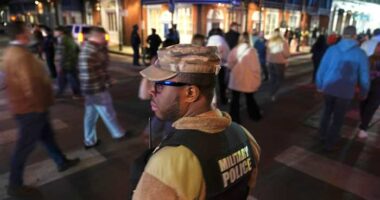Share this @internewscast.com

GREENBELT, Md. – A resident of California who tried to murder U.S. Supreme Court Justice Brett Kavanaugh at his Maryland home was sentenced to more than eight years in prison by a federal judge on Friday. This sentence is notably lighter than what the Justice Department had recommended.
Sophie Roske, a transgender woman who was charged under the name Nicholas Roske, could have faced a life sentence. U.S. District Judge Deborah Boardman handed down an eight-year and one-month prison term with lifelong court supervision. Prosecutors had pushed for a minimum of 30 years in prison, in line with sentencing guidelines.
At the age of 26, Roske was caught with a pistol, knife, zip ties, and burglary tools when a taxi dropped her outside Kavanaugh’s home in Chevy Chase, Maryland, around 1 a.m. on June 8, 2022. Upon seeing two U.S. Marshals Service deputies guarding the residence, she walked away and called her sister. She then dialed 911, expressing suicidal and homicidal thoughts and the need for psychiatric assistance.
The judge noted that law enforcement was unaware of Roske’s plan until her 911 call confessing the crime voluntarily. Boardman labeled Roske’s actions as “reprehensible” but acknowledged her decision to abandon the plot before law enforcement discovered her in the vicinity.
“This is an atypical defendant in an atypical case,” she said.
Attorney General Pam Bondi announced that the Justice Department plans to appeal “the woefully insufficient sentence … which does not match the gravity of this case.”
“The attempted assassination of Supreme Court Justice Brett Kavanaugh was a vile assault on our judiciary system by a deeply troubled individual,” Bondi stated.
Roske apologized to Kavanaugh and the justice’s family “for the considerable stress I put them through.”
“I have been portrayed as a monster, and this tragic mistake that I made will follow me for the rest of my life,” Roske said before learning her sentence.
Boardman acknowledged that Roske’s plot caused “real harm” to Kavanaugh and his family.
“He’s a justice of the Supreme Court, but he’s a human being,” the judge said.
After her arrest, Roske told investigators she was angry about a leaked draft opinion suggesting the Supreme Court intended to overrule Roe v. Wade, the landmark abortion case, according to an FBI affidavit. Roske also was upset about the school massacre in Uvalde, Texas, and believed Kavanaugh would vote to loosen gun control laws, the affidavit said.
Roske’s case underscores the pervasive threat of political violence in a polarized nation: The number of threats and “inappropriate communications” directed at federal judges and other court employees more than quadrupled over a seven-year span, from 926 incidents in 2015 to 4,511 in 2021, according to the Marshals Service.
Roske targeted three of the high court’s justices, prosecutors said. Killing one judge could change the decisions of the nine-member court “for decades to come,” Roske wrote over an encrypted messaging platform to another user in May 2022. Roske added, “I am shooting for 3.”
Roske, 29, of Simi Valley, California, searched the internet for justices’ home addresses and other information, including techniques for breaking into homes and quietly killing somebody. Roske also wrote about killing judges in encrypted messages.
“The thought of Roe v Wade and gay marriage both being repealed has me furious,” Roske wrote.
Roske pleaded guilty in April to an attempted assassination charge without reaching a plea agreement.
Prosecutors recommended a prison term of no less than 30 years, followed by a lifetime of supervised release.
“The defendant’s objective — to target and kill judges to seek to alter a court’s ruling — is an abhorrent form of terrorism and strikes at the core of the United States Constitution and our prescribed system of government,” they wrote.
Roske’s attorneys asked for a prison sentence of eight years. They said she is ashamed and remorseful for frightening Kavanaugh and his family.
“I am very glad I did not continue,” Roske wrote in a letter submitted to the court. “I am also sorry for contributing to a trend of political violence in American politics. I can see now how destructive and misguided such acts are, and am ashamed to have not recognized these things sooner.”
Roske’s lawyers said she was struggling with mental illness and her gender identity. She came out to herself as a transgender woman in 2020 but kept it a secret from her parents. She recently resumed receiving gender-affirming care while imprisoned, according to her attorneys.
Roske was severely depressed and suicidal in May 2022 when Politico published a leaked draft of the Supreme Court’s abortion rights opinion. Roske decided she could “give her life some meaning” by stopping the Supreme Court from overturning Roe v. Wade, her lawyers said.
“Crucially, she stopped short of causing harm to another person,” they wrote. “Her actions resulted in large part from isolation and inadequately treated mental illness. But in her deepest moment of crisis she showed her humanity.”
Prosecutors said Roske’s mental illness isn’t an excuse.
“The sentence here must forcefully convey to the defendant and others that taking matters into one’s own hands as the judge, jury, and executioner is wholly condemned and will be punished,” they wrote.
Roske’s parents, Vernon and Colleen, also apologized to Kavanaugh during the sentencing hearing. Vernon Roske said he wishes that he had communicated better with Sophie about her personal struggles.
“I should have pushed for her to get better care,” he added.
Copyright 2025 The Associated Press. All rights reserved. This material may not be published, broadcast, rewritten or redistributed without permission.












